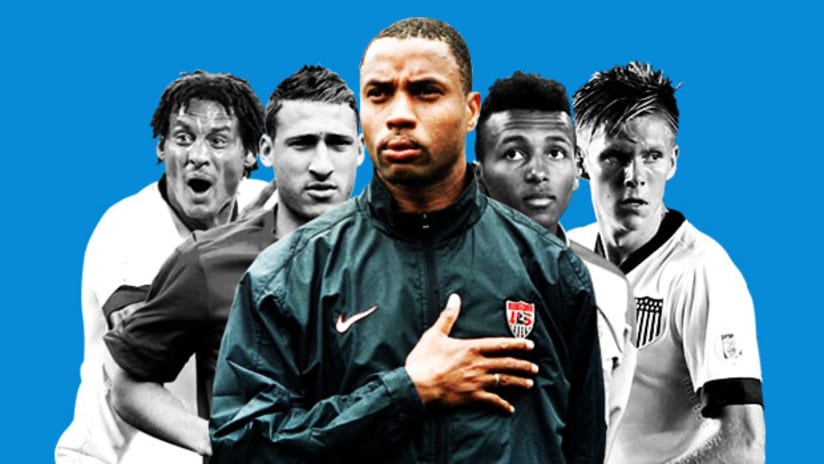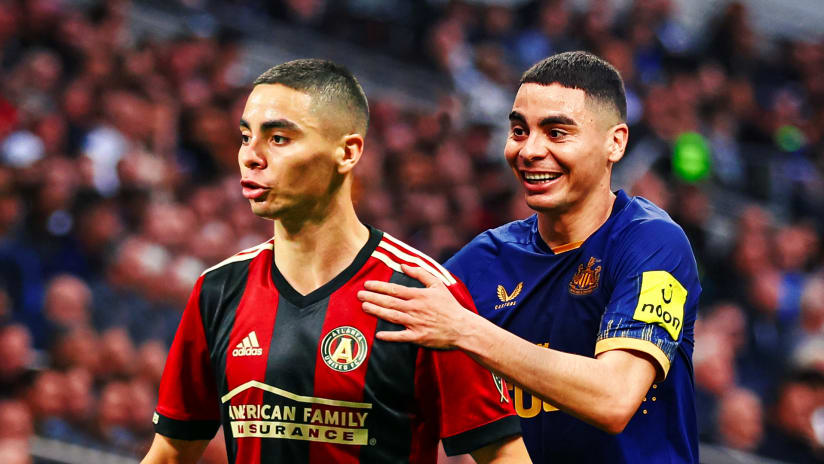THE WORD is MLSsoccer.com's regular long-form series focusing on the biggest topics and most intriguing personalities in North American soccer. This week, managing editor Jonah Freedman reflects on the legacy of David Regis, a French defender who abruptly joined the US national team just weeks before the team's ill-fated appearance in the 1998 World Cup. Did his arrival somehow disrupt the team's chemistry, and are there lessons to be learned about this summer's potential inclusion of Germany-bred teenager Julian Green?
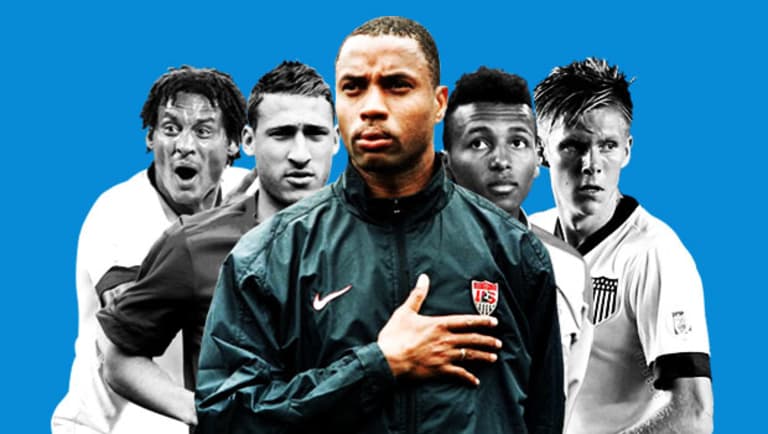
Julian Green is an American.
That’s simple fact. He’s lived in Germany since the age of 2, but he was born in Tampa in 1995, the son of a former US serviceman and a German mother. He holds a US passport and has dual citizenship.
Julian Green has the right to represent the United States in international soccer.
That’s not up for debate, either. Regardless of his German upbringing and past experience with Germany’s youth national teams, the Bayern Munich prodigy filed a onetime switch with FIFA just last month to represent the country of his birth at the senior international level.
Julian Green deserves a spot on the US national team’s World Cup roster this summer.
That’s where it gets tricky. Two weeks ago, Green received his first senior cap at any level, coming off the bench in the US’ 2-2 draw with Mexico in a friendly in Phoenix.
Next month, the 18-year-old will probably receive a call-up to Jurgen Klinsmann’s 30-man pre-World Cup camp in Northern California. If that goes well, it’s highly likely Green will grab one of the 23 plane tickets to Brazil.
In a span of 10 weeks, an unproven, unfamiliar player who has spent nearly his entire life in Europe could be wearing the red, white and blue for the US national team in their seventh consecutive World Cup appearance.
All without doing a single thing to help them get there.

Tampa-born Julian Green made his debut with the US national team against Mexico on April 2, just weeks after filing a one-time switch of allegiance with FIFA. (USA TODAY Sports)
Green didn’t make one appearance in the USMNT’s slog through World Cup qualifying. He didn’t endure the controversy that surrounded adjusting to an unconventional coach. He wasn’t part of an often-contentious locker room that somehow rallied around adversity. He didn’t have the chance to form a bond with his teammates during tense moments in crucial qualifiers against Costa Rica and Mexico.
And yet when the final roster for Brazil is named, it’s possible that he’ll take the place of a player who did all of those things.
It has the makings of an uncomfortable flight. And it’s almost the exact same scenario the USMNT faced 16 years ago.
George Santayana, another dual-national American, once penned the words, "Those who cannot remember the past are condemned to repeat it."
David Regis wasn’t the reason the US finished 32nd out of the 32 teams at the 1998 World Cup. In fact, he accounted well for himself despite the Americans losing all three of their games. But his late inclusion on the roster was certainly a factor in a previously high-flying team crashing out in the US’ worst-ever showing at a World Cup.
It’s been more than a decade since Regis has spoken on the record with a member of the American soccer media. But on the eve of another World Cup, he has resurfaced. And arguably the biggest enigma in US Soccer history says he knows exactly what Green is potentially about to go through.
–-
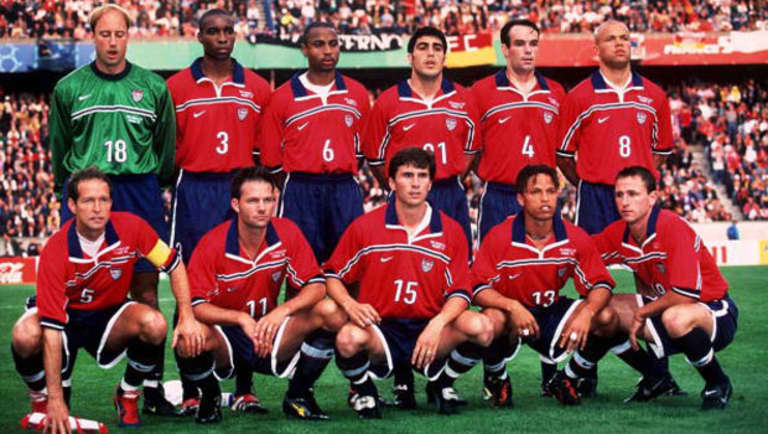
French defender David Regis (6) joined the USMNT in the spring of 1998, just weeks before the World Cup. He went on to start all three games in France, but his arrival left at least one player thinking, "You’d better be better than what we have." (Getty Images)
–-
David Regis regrets the fact that he’s lost contact with everyone from his five years as a US national teamer.
Not one of his former teammates, not a single coach or US Soccer official. Not a soul involved in American soccer.
“No, no one at all,” the two-time World Cup veteran says over the phone from Luxembourg, where he’s spent the last three years working on the technical staff of a second-division club called FC Mondercange. “It’s unfortunate, because they were a good family, especially in 2002 when we went so far in the World Cup.”
Regis still looks back fondly on those days, despite the disaster in France. Between 1998 and 2002, he was capped 27 times by the USMNT and was on two World Cup rosters. But that only tells a small fraction of the story.
Bring up his name to his former teammates, and it’s one that provokes mixed emotions. As a man, he was a welcome addition to the team: easygoing, friendly and, ironically, easy to talk to despite his lack of proficiency with the English language.
What he represents, however, was one of the final straws in an ultimately doomed team that, hindsight will tell you, was broken before the 1998 World Cup.
“The best decision at the time and hindsight are two different things,” muses US Soccer president Sunil Gulati, who then served as the federation’s managing director of national teams. “When you bring in any new player, you have to look at how they’re going to affect you on the field, how they’re going to affect locker-room dynamics.
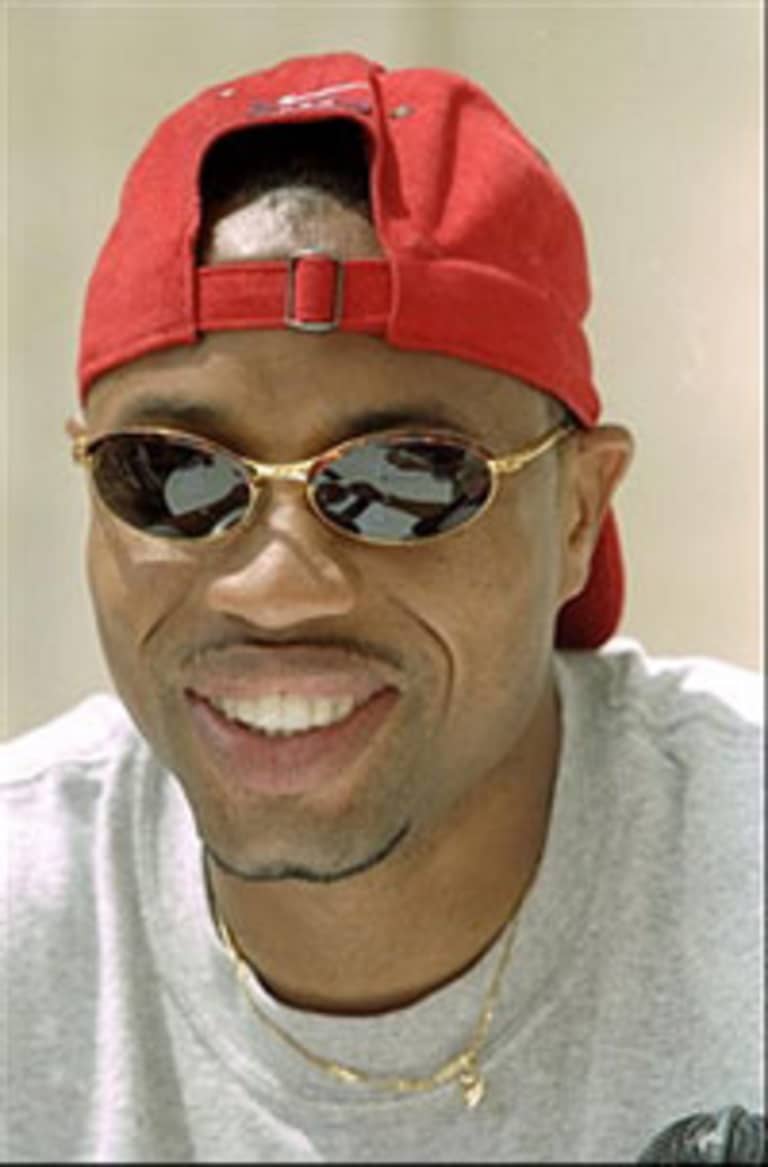
Born in the Caribbean island of Martinique, Regis was eligible for the USMNT because he was married to an American woman. He eventually took the starting spot at left back in place of team mainstay Jeff Agoos. (Getty Images)
“That’s true for a player who’s been part of the program in the past and it’s more true in a situation like this where you have a player who was naturalized.”
Regis was born in 1968 on the Caribbean island of Martinique before moving to France as a teenager. A skilled central defender and left back with a wicked left foot, he quickly rose up the ladder of French soccer, spending time at three Ligue 1 clubs and earning a transfer to Bundesliga club Karlsruher SC.
That’s when he first came to the attention of former USMNT head coach Steve Sampson. In the fall of 1997, less than a year from the World Cup, Sampson learned Regis was married to an American woman from Georgia. By the letter of the law, that meant he was eligible for US citizenship – and a spot on the national team.
Over the months that followed, Sampson aggressively pursued Regis and convinced him he had a future with the USMNT. By the following May, mere weeks before the first ball was kicked at France ’98, Regis’ application for American citizenship was fast-tracked, and he was called into his first camp with his adopted homeland.
On its own, that wasn’t so remarkable. Foreign-born players were common in the USMNT fold, including cultured Dutch-born midfielder Earnie Stewart and hard-nosed German-born sweeper Thomas Dooley, both sons of American servicemen.
“Thomas did help me a lot,” Regis says of his integration into the team. “He was the captain, we both spoke German and he knew the team, the players and everything. We both played defense, so it made it easier for me to adapt to the team’s play.”
The issue was the timing. The team was riding a wave of confidence that started to pick up steam in September 1997. It began with a 1-0 win over Costa Rica in Portland, thanks to a memorable rocket from Tab Ramos, continued with an historic 0-0 draw with 10 men at Estadio Azteca – the team’s first-ever result of any kind on Mexican soil – and peaked with a first-ever victory over then-reigning World Cup champions Brazil in the CONCACAF Gold Cup semifinals in February 1998.
But the foundation was coming apart. In April of ’98, Sampson made the controversial decision to drop his captain, John Harkes, from the roster. At the time, the coach said it was for disciplinary reasons. But in the years that followed, the truth emerged that Harkes had an extramarital affair with the wife of prolific striker Eric Wynalda. Regardless, the shocking move left the team shaken.
Sampson kept tinkering with his squad in the run-up to the World Cup. In friendlies that spring, he introduced a midfield-heavy 3-6-1 formation that pushed veteran contributors like Wynalda, Alexi Lalas and Marcelo Balboa to the bench.
And then came the introduction of Regis.
The Frenchman was a natural left back, a position that had been held with the US for their entire qualifying campaign by Jeff Agoos. The then-D.C. United defender, 30 at the time, had been one of the more consistent players for the US and had rebounded fantastically from being the last player cut from the 1994 World Cup roster. The players were confused by Regis' inclusion.
“Regis came with a better pedigree, but we’d never seen him play,” Lalas recalls. “We’d be standing there with our arms crossed thinking, ‘You’d better be better than what we have.’ We thought we were pretty good. We were thinking, ‘Why do we need this?’”
Agoos was equally at a loss.
“You know when someone comes in and he’s head and shoulders above what you’ve got,” he says. “I always felt like I could compete with who was in that position and felt like I could compete with David. The coaching staff felt they could go with David.”
–-
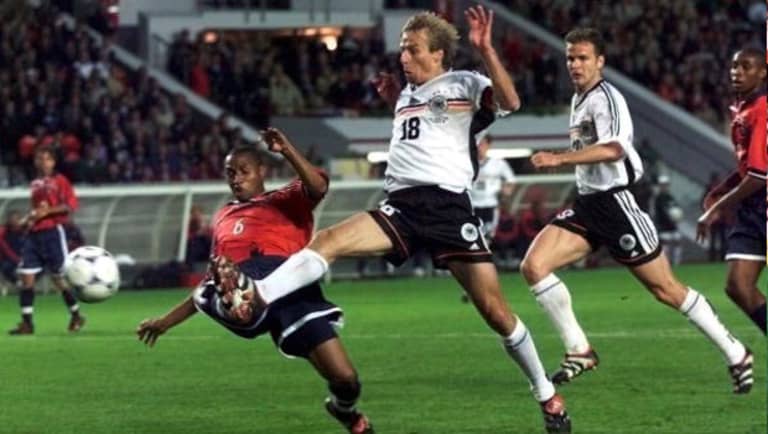
Regis defends German striker Jurgen Klinsmann (18) during the USMNT's 2-0 loss in their first match of the 1998 World Cup. A number of US players never played for the team after France, but Regis went on to make the 2002 World Cup roster. (Getty Images)
–-
In the US’ final two friendlies before the World Cup, Sampson gave Regis the start at left back over Agoos. By the beginning of June, when Sampson submitted his 23-man roster to FIFA, it was imminently clear Regis would be the team’s starting left back in France.
Regis never felt like an outsider, though he knows the US squad easily could have treated him that way. He felt welcomed by his teammates, and still remembers laughing with Dooley and Tony Sanneh, both of whom spoke German, listening to Lalas play guitar and befriending young defender Eddie Pope despite the language barrier. But he was also highly aware of what his presence meant. To this day, he defends his spot on the team based on what he brought to the table.
“What may have made it tricky had more to do with the player I was [competing with] instead of the fact that I came at the last minute,” he says, without mentioning Agoos by name. “I came at the last minute because of the passport, but not because of my play.
“If I had been brought into the 22 or 23 players to be a substitute, maybe I’d have said it was pointless. But the three games we played, and the friendlies as well, I was an undisputed first-team regular. Selecting a player is not about pleasing anyone, it’s about someone providing quality to a team, and I think that’s what I did.”
But Regis wasn’t with the team long enough to be close to the drama, according to Lalas. Sampson had been slowly losing his locker room based on “strange personnel decisions,” the puzzling tactical switches and, of course, his handling of the Harkes-Wynalda situation.
Lalas admits the team’s veterans – particularly those who played in the ’94 World Cup held in the USA just four years prior – felt a sense of entitlement, and he now acknowledges that the team had an inflated idea of its quality based on results of the past. That didn’t help Sampson make personnel decisions that perhaps he needed to make to make the team better.
“At that point, anything Steve was trying to do, a handful of guys weren’t on board," recounts Pope, then a 24-year-old rising defensive star. "Young guys like me and Frankie [Hejduk] were like, ‘Whatever, just tell me what to do.’ The older guys felt like they should be starting. It wasn’t a comfortable place.”
Making a choice at the expense of Agoos, an undisputed team leader and one of the locker-room favorites, however, might have been a step too far.
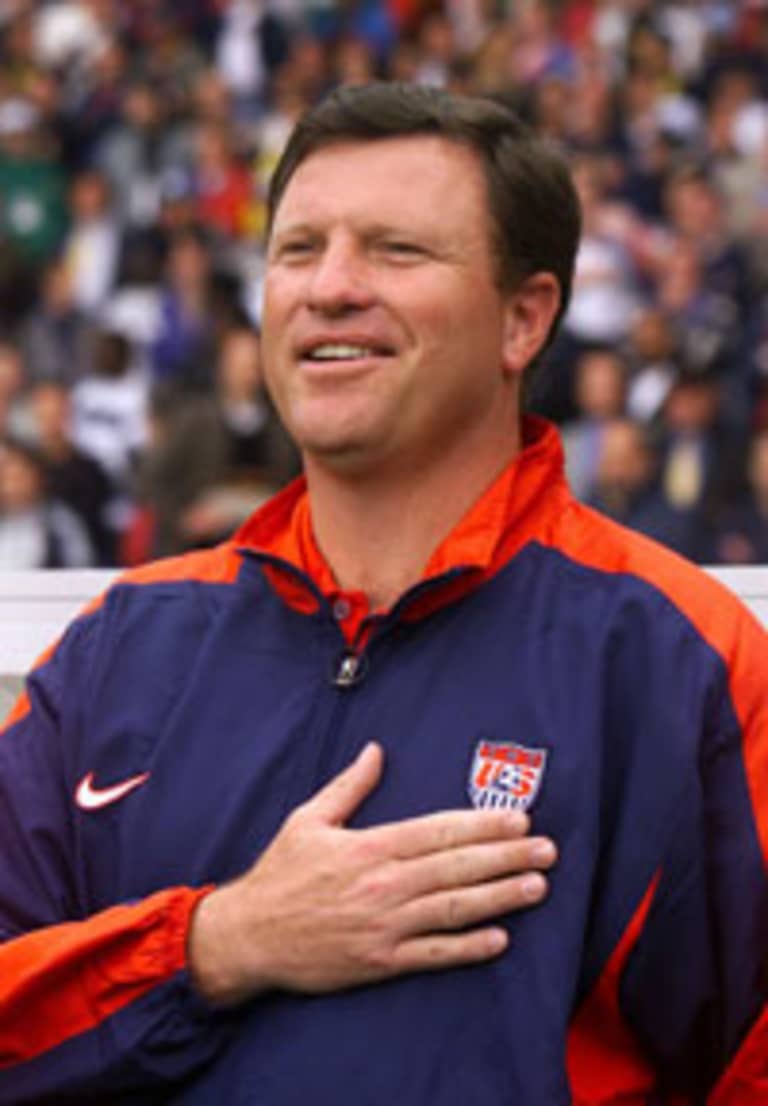
Former USMNT head coach Steve Sampson stepped down after the 1998 debacle, and later said he regretted adding Regis to the roster so late before the World Cup began. (USA TODAY Sports)
“In a certain way, if this had happened with a different position, it might have been a little easier to swallow,” Lalas says. “Nobody looked at our team and said left back was a real problem. If [Regis] was a goalscorer and we could count on lots of goals, that’s a different story. But it became readily apparent he was not better than anything we had.”
When the World Cup kicked off, the US’ issues and lack of depth were quickly exposed. They were dispatched easily by Germany, 2-0, in Paris, not a surprise given the quality of the team captained by, of all people, Klinsmann. The real surprise came six days later when they lost to Iran, 2-1, in Lyon, in a match remembered more for its political overtones than for the fact that the US hit a patch of bad luck. And the post – four times.
By the time the Americans arrived in Nantes for their group-stage finale against Yugoslavia, they had already been mathematically eliminated. The collapse was complete. Regis was just one decision called into question.
“Again, everything’s hindsight,” says Gulati. “The Germany game didn’t go well. But if Claudio Reyna’s ball doesn’t hit the crossbar [in the 33rd minute] and you get a result against Iran – and we could've – people are talking about that tournament differently.
“Clearly preparation and the decisions you make affect results. But results also affect people’s perception of what the preparation and everything else was like.”
Following the tournament, Sampson resigned and several players never suited up for the national team again. Regis was not one of them. Bruce Arena kept him in the squad in the run-up to the 2002 World Cup and he earned another 22 caps for the USMNT. Ironically, he didn’t appear in a single game for the Americans at Korea/Japan. Agoos started three.
“I didn’t blame David,” Agoos says of the ’98 experience. “I never did. I liked him. We all did. But I’ve always been a guy who put the team first. I thought, if this would help us, I’ve got to be behind it. Unfortunately, it wasn’t the right call. [Bringing him in] was a poor decision.”
Sampson, for his part, told MLSsoccer.com earlier this month that he regrets adding Regis at the expense of the team.
“I made a mistake allowing Regis to join so late in the game,” Sampson said. “It affected our chemistry. I probably should’ve left him off the squad and let Jeff Agoos play left back. But [Regis] was a good player, playing in the Bundesliga. It was very attractive.
“But hindsight is 20-20 vision. The stability and chemistry should’ve been more important than one player.”
–-
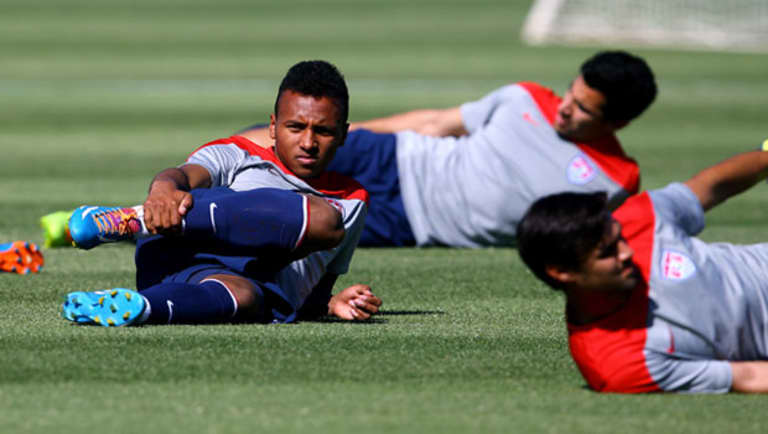
Green stretches during a USMNT training session last month, days ahead of his debut against Mexico. If the teenager does make the World Cup roster this summer, it will come at the expense of an older, more established player. (Getty Images)
–-
To an outsider, the current US national team doesn’t appear to have any chemistry problems heading into this summer's World Cup. If anything, the air was cleared last spring when the team rallied around the controversial Sporting News story that exposed a lack of faith with Klinsmann’s tactics and his squad selection – not the least of which was the coach’s insistence on including in the team several German-Americans, such as Jermaine Jones, Fabian Johnson and a handful of others who didn’t come up through the US Soccer system.
That experience had the potential to turn into another situation like Sampson had on his hands. But instead of splintering, the controversy seemed to unite the US squad. As a result, they wrapped a historic 2013 that included a record 12-game winning streak, their first Gold Cup title since 2007 and a third straight World Cup qualifying campaign in which they finished atop the CONCACAF Hexagonal.
And for the record, they accomplished all that with a handful of dual nationals making big contributions, including Jones, Johnson, Mix Diskerud and Aron Johannsson.
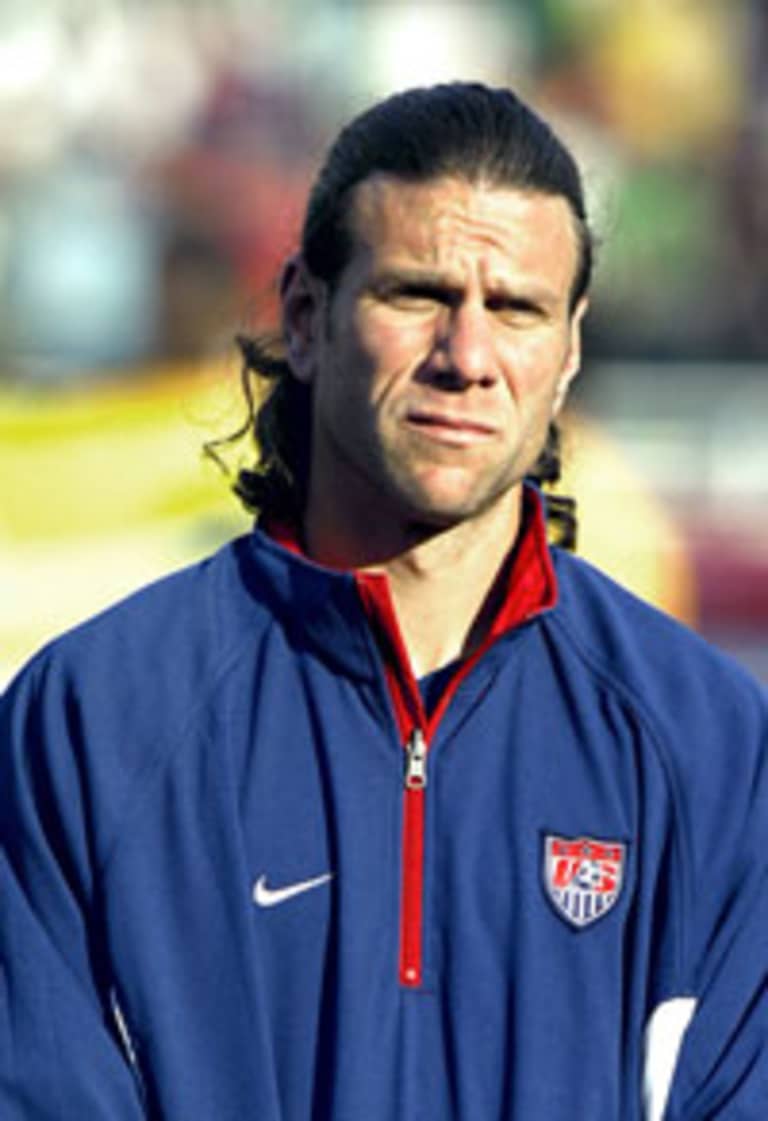
Former USMNT defender Jeff Agoos, who lost his starting spot to Regis in 1998, insists "when you make wholesale changes so late in the cycle, there’s always risk." (Reuters)
It’s now when their resolve will really be tested. The results haven’t come as smoothly in recent months, with the US only winning once in their past five friendlies and Klinsmann making a surprising decision to dump his main tactical assistant coach, Martin Vasquez, last month. Throw in a Group of Death draw that sees the Americans facing the world's No. 2- and 3-ranked teams in their World Cup group in Germany and Portugal, and the team will need to be as cohesive as possible to avoid a 1998-like result.
When a coach comes touting a new face like Green this close to the tournament – and makes no bones about his potential to take one of the final 23 places on the team – you can’t help but look back on the Regis experiment.
“When you make wholesale changes so late in the cycle, there’s always risk,” Agoos observes before quoting Santayana himself. “It sounds cliché, but if you don’t learn from history, you’re bound to repeat it. And I’m sure Klinsmann and Sunil – who goes all the way back to ’98 – have taken that into account.”
Green and Regis are, admittedly, a bit of an apples-to-oranges comparison. Regis was an established player in the prime of his career, yet his connection to the US was tenuous at best – “It might have felt like to some that we were bringing in a ringer,” Gulati acknowledges – while Green is a young player with potential. He’s made just one appearance for Bayern’s senior team, and has spent this season with Bayern Munich II, the club’s reserve team that competes in the German fourth division.
However, he’s an American by birth and selected the US over Germany, a coup by any measure for the US Soccer Federation.
Regardless, Klinsmann has hinted that Green could earn a spot on the World Cup roster despite just a scant 31 minutes and nine touches in a USMNT uniform. If he does, that means an attacker in the pool who has been a part of the qualifying cycle will stay home at his expense.
Who could that be? Perhaps Chris Wondolowski, who has come on strong with 10 goals in his last nine US appearances? Eddie Johnson, a veteran of the 2006 World Cup who has found a new lease on life as a timely goalscorer under Klinsmann? Or even three-time World Cup veteran Landon Donovan, who seems to be constantly in and out of Klinsmann’s good graces and now admits his own mortality as a player? And what could that do to team chemistry so late in the game?
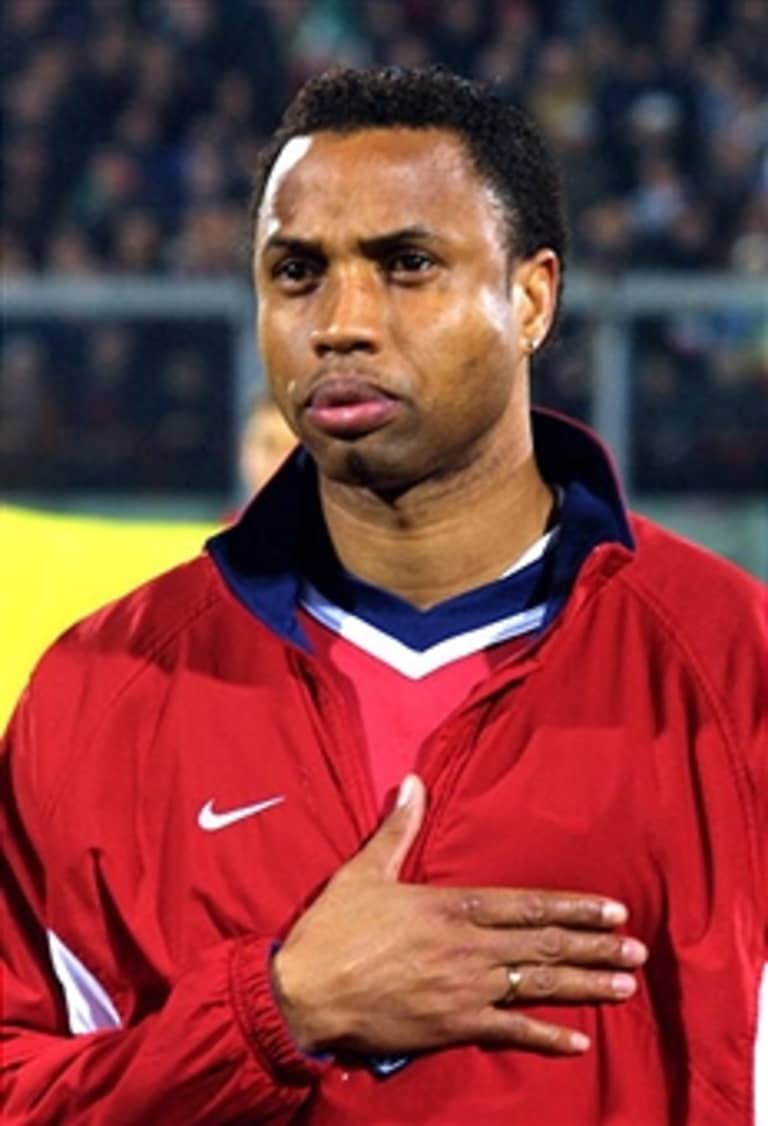
Regis never played for the US after 2002, but he says he has no regrets about his controversial inclusion on the team. "Even if you’re not born an American" he says, "when you wear that star-spangled jersey, live it to the full.” (Getty Images)
The parallels back to Regis aren’t lost on Lalas.
“I know players will be looking at Julian Green that way,” he says. “He won’t start, but he might take minutes away from someone else. And yes, there is the possibility he may take a spot at the World Cup away from someone else.
“That can be a bitter pill for someone to swallow. You don’t take it out on the player, but him being there is a constant visual reminder of what could be perceived as a slight or a wrong.”
It all comes down to how Klinsmann handles it, Lalas says. The German coach needs to have a frank, “come-to-God” conversation with his entire team and map out his reasoning for including Green, how he believes he can help the team and where that leaves everyone else. And then open the floor for every player to air his thoughts. That’s something the ’98 team collectively never heard from Sampson, he says.
“And not just in front of select players,” Lalas adds. “In front of everybody. Julian Green is going to have to listen to everybody’s words. Some might not be fair. Some might hurt him. But Klinsmann has to let that be aired and encourage that honesty. [He needs to] assure them that, ‘If you have something to say, I’m not sending you home.’ But let’s do this before we get to Brazil.”
That conversation hasn’t occurred quite like that. According to a US Soccer spokesman, Klinsmann has indeed spoken with the team about Green, both at his first camp last month in Frankfurt, Germany, ahead of the Ukraine friendly in Cyprus, and again earlier this month in Phoenix. But according to the spokesman, that’s something Klinsmann does any time a new player comes into camp and doesn’t go much beyond basic introductions.
Gulati says that's all at Klinsmann's discretion. But he does think he and the rest of the USSF learned something from the Regis experience.
“I think the strict lesson is, any time you bring in a player and there’s going to be somebody displaced, whether that’s three days out of three months out, the situation has to be handled with care," he says. "Those situations are different. The closer it is to a tournament and the newer a player is to the group, the more sensitive things are and the more care you have to take."
As for Regis, don’t worry about him. He’s been divorced from his wife for a year, rendering the very reason he become a US international now moot. But the experiences he had, he says, make him feel more American than ever. And he very badly wants to return to the United States and stay in the game as a coach or on the technical side, and to be closer to his two daughters, who live in Atlanta.
In the meantime, he has some simple words of advice for Green.
“You have to live the experience to the full,” says Regis, now 45. “When I wore that jersey, I was an American player, but I was even more engaged than that. I didn’t want to lose. It was something that I loved and I did it 100 percent. No regrets.
“If I could give advice to someone in this situation, even if you’re not born an American [or raised as one], when you wear that star-spangled jersey, live it to the full.”
MLSsoccer.com Montreal Impact beat reporter Olivier Tremblay contributed reporting to this story.


